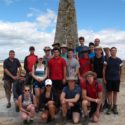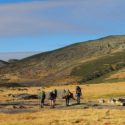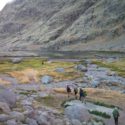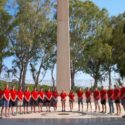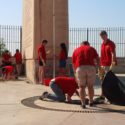Early on 11th August, 17 cadets from Oakham School CCF departed on an expedition which was to combine an appreciation of two battlefield sites from the Peninsular Campaign with a challenging trek across the Sierra de Gredos mountains of central Spain. The journey took in a 24-hour ferry crossing between Portsmouth and Santander which provided a good opportunity to have the battle pictures explained and reviewed.
The first appointment was at Salamanca in central Spain. Though hot (with cadets walking the battlefield as an acclimatisation element to their main walk), the terrain around this magnificent city was relatively flat. This battlefield was particularly poignant for the contingent as it represents one of the finest hours of the Essex Regiment – a forebear of our current sponsors, the Royal Anglian Regiment. To pay our respects and to mark our visit, the senior cadet laid a wreath before a brief period of reflection. The Arapiles (those hills so central to the battle) now look so beautiful, but every cadet felt a strong sense of just what it would have been like in 1812!
Following a ‘preparatory’ meal in the main square that evening, the expedition moved to El Barco de Avila – the start point of the trekking phase. For four days the cadets walked some 18 kilometers per day, staying in refugios, seeing outstanding flora and fauna, and experiencing an arduous trek at an altitude not available in the UK (the peaks around their route topped out at over 2,500 metres). Walking slowly at first, as the altitude provided unusual new challenges beyond the scope of our technical preparations in the Durham Dales, the cadets found rhythm on most days and spirit and character when rhythm was hard. At the culmination of the four-day trek in Hoyos Del Espina, every cadet was tired and emotionally drained. They very clearly left nothing behind. The summary of any report of this nature will understandably focus on the physical and technical accomplishments of the cadets, but this expedition made each one dig deeper than they knew they could – adventurous training at its best.
Without lingering to bask in the pride of having finished, the group were quickly on to the next phase of the expedition to Talavera for some community work and another battlefield appreciation. As we dropped down from the mountains the temperature kept rising: 27-28 degrees at first, rising towards 38 degrees within an hour. This was a good moment to stop and to take some time to appreciate how it might have felt to have marched from France to Portugal and back again, fighting huge battles on the way and suffering the most inhumane of conditions whilst doing so. The cadets did not find even this appreciation easy!
Whilst at Talavera, we were able to complete the essential other component of our annual expeditions – community work. The monument to the battle of Talavera is not old, but it is very grand. That said, it is not well kept by the Spanish authorities. With 17 cadets and 5 staff spending four hours uprooting self-seeded trees, scrubbing the stains from the stonework and polishing the ceramic tiles, we can justifiably say that we have contributed again to the military family and have appreciated the support we have been lucky enough to secure. Leaving good work behind us has been a theme now across several years and both hemispheres.
The final formal element of the expedition was the walking of the Talavera battlefield. Our intent as staff was not to reflect every military detail – our combined knowledge, despite research was not up to this – but to illustrate some examples of leadership, bravery and the British Army at its best. If that is a legacy we have left with these cadets, it will have been a worthwhile expedition!
Before leaving Talavera, we left wreaths to commemorate the actions of 48th of Foot and the Royal Wagon Train (whose successors now sponsor us).
What we achieved on this expedition would not have been possible without the assistance of the Units mentioned in this report and of the Ulysses Trust, whose understanding of the value of adventurous training on young, ambitious people makes an invaluable contribution to the success of varied expeditions such as these. 17 cadets have returned knowing a lot more about the Peninsular campaign, about the hardships of the soldier of the early 1800s and, crucially, about themselves! For all who have supported us, we are very grateful.

